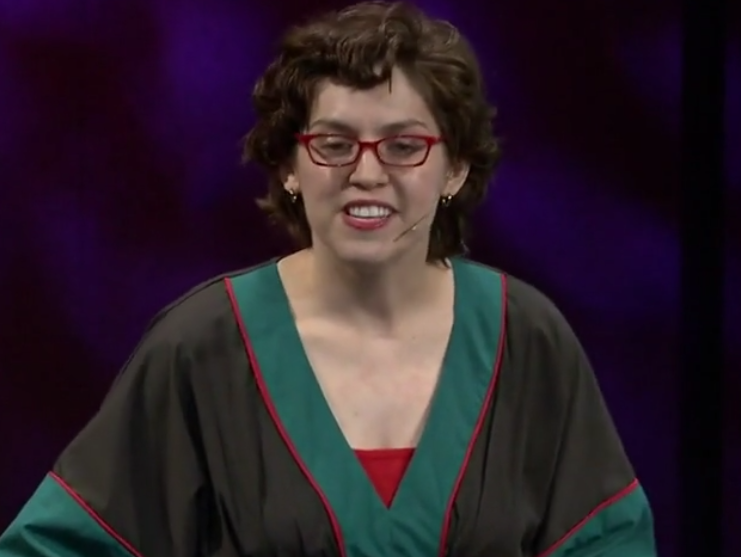So -- now, when you think about this, what we have here is a ham butt problem.
所以,現在,當你想到這些,我們面對的問題其實是火腿屁股的問題。
Does everyone know the ham butt problem?
有人知道火腿屁股的問題嗎?
Woman's making a ham for a big, family dinner.
有個女人正在弄火腿,給一個大家庭做晚餐。
She goes to cut the butt off the ham and throw it away,
她正要把火腿根部切去扔掉,
and she looks at this piece of ham and she's like,
看著那片火腿,她想,
"This is a perfectly good piece of ham. Why am I throwing this away?"
“這其實是塊好肉,為什么我要把它扔掉呢?”
She thought, "Well, my mom always did this."
她繼續想,“可是我媽都是這么做的”,
So she calls up mom, and she says, "Mom, why'd you cut the butt off the ham, when you're making a ham?"
于是她打電話給她媽媽,問,“媽媽,為什么你做火腿的時候要把火腿屁股切掉?”

She says, "I don't know, my mom always did it!"
她媽媽說,“我不知道,我媽一直都這么做的!”
So they call grandma, and grandma says, "My pan was too small!"
于是她們又打電話給外婆,外婆說,“我的鍋太小了!”
So, it's not that we have good words and bad words. We have a pan that's too small!
所以,這不是因為有好詞和壞詞的存在,只是我們的鍋太小了!
You know, that ham butt is delicious! There's no reason to throw it away.
要知道,其實火腿屁股味道可好了!沒理由把它扔掉。
The bad words -- see, when people think about a place
所謂的壞詞——當人們想去一個地方,
and they don't find a place on the map, they think, "This map sucks!"
卻不能在地圖上找到這個地方,他們就認為,“這地圖一點用也沒有!”
When they find a nightspot or a bar, and it's not in the guidebook,
當人們發現一個旅游指南上沒有的夜店或酒吧,
they're like, "Ooh, this place must be cool! It's not in the guidebook."
他們又認為,“旅游指南上沒有的,這地方一定很酷!”
When they find a word that's not in the dictionary, they think,
而當人們發現一個字典上沒有的單詞,他們就覺得
"This must be a bad word." Why? It's more likely to be a bad dictionary.
“這個一定是壞詞”。為什么呢?這其實更像是一本壞字典的問題。
Why are you blaming the ham for being too big for the pan? So, you can't get a smaller ham.
為什么要責怪火腿比鍋大呢?你不能找到小一點的火腿,
The English language is as big as it is.
因為英語本身就很大。











